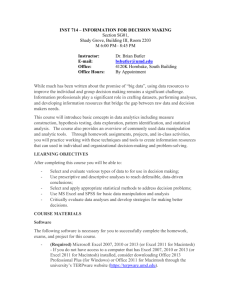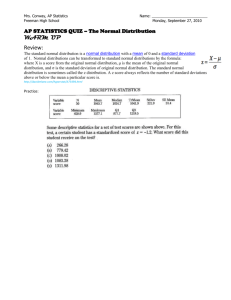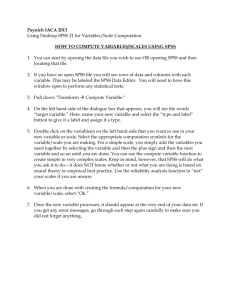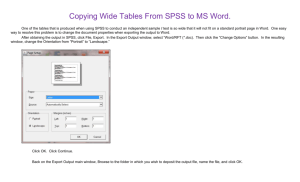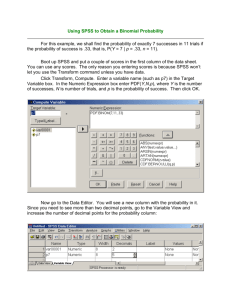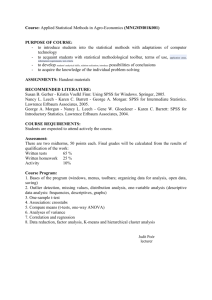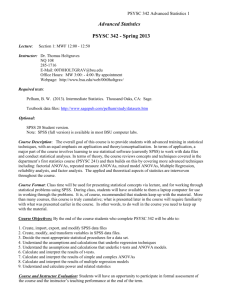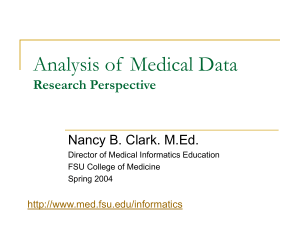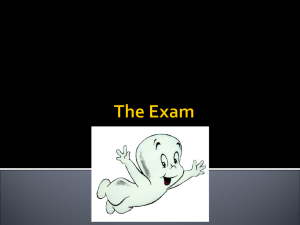- College of Information Studies
advertisement
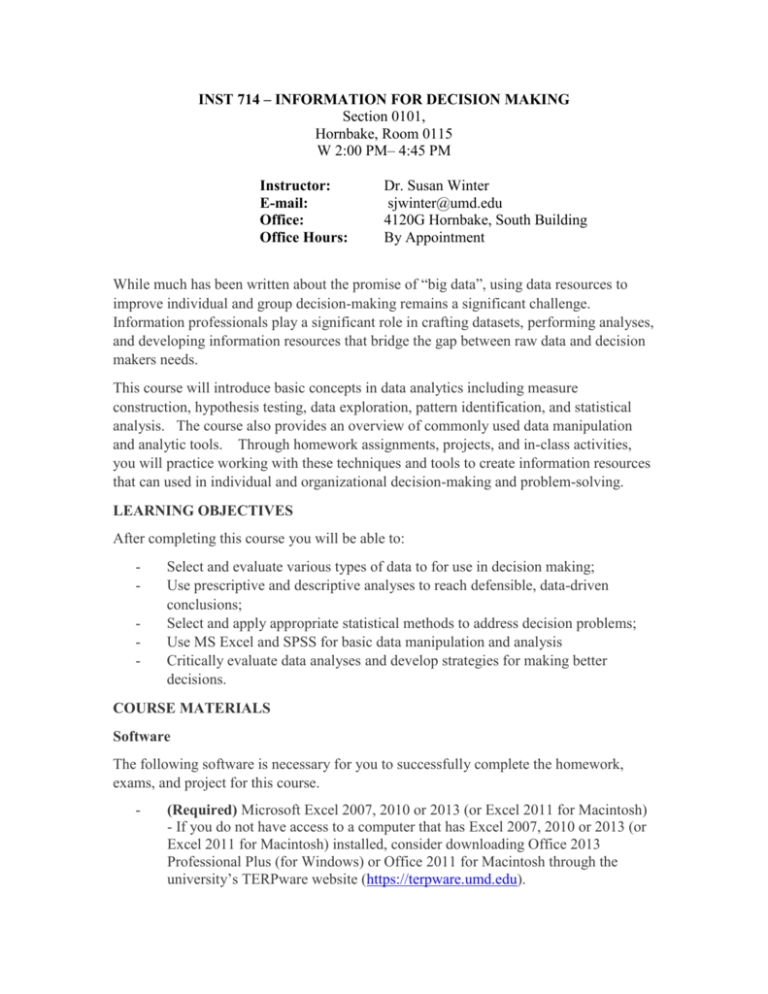
INST 714 – INFORMATION FOR DECISION MAKING Section 0101, Hornbake, Room 0115 W 2:00 PM– 4:45 PM Instructor: E-mail: Office: Office Hours: Dr. Susan Winter sjwinter@umd.edu 4120G Hornbake, South Building By Appointment While much has been written about the promise of “big data”, using data resources to improve individual and group decision-making remains a significant challenge. Information professionals play a significant role in crafting datasets, performing analyses, and developing information resources that bridge the gap between raw data and decision makers needs. This course will introduce basic concepts in data analytics including measure construction, hypothesis testing, data exploration, pattern identification, and statistical analysis. The course also provides an overview of commonly used data manipulation and analytic tools. Through homework assignments, projects, and in-class activities, you will practice working with these techniques and tools to create information resources that can used in individual and organizational decision-making and problem-solving. LEARNING OBJECTIVES After completing this course you will be able to: - Select and evaluate various types of data to for use in decision making; Use prescriptive and descriptive analyses to reach defensible, data-driven conclusions; Select and apply appropriate statistical methods to address decision problems; Use MS Excel and SPSS for basic data manipulation and analysis Critically evaluate data analyses and develop strategies for making better decisions. COURSE MATERIALS Software The following software is necessary for you to successfully complete the homework, exams, and project for this course. - (Required) Microsoft Excel 2007, 2010 or 2013 (or Excel 2011 for Macintosh) - If you do not have access to a computer that has Excel 2007, 2010 or 2013 (or Excel 2011 for Macintosh) installed, consider downloading Office 2013 Professional Plus (for Windows) or Office 2011 for Macintosh through the university’s TERPware website (https://terpware.umd.edu). - (Required) SPSS Statistical Analysis software - The student version available at TERPware website (https://terpware.umd.edu) is fine. - (Recommended) Microsoft Access, mySQL, or some other relational database may be helpful for working different datasets. Readings and Online Resources: There are many good texts and online sources for information on decision-making, statistical techniques and data tools. Because each student’s needs and interests will differ, none of these are explicitly required, but here are some you may find helpful. Judgment and Decision Making: - The Psychology of Judgment and Decision Making (Scott Plous) McGraw-Hill ISBN: 0070504776 Statistics and Statistical Reasoning - - - HyperStat Online Statistics Textbook - http://davidmlane.com/hyperstat/ Williams, F. & Monge, P. (2001), Reasoning with Statistics: How to Read Quantitative Research (5th Edition), Harcourt College Publishers: Fort Worth, TX, ISBN 0-15-50681-6 Rice Virtual Lab in Statistics - http://onlinestatbook.com/rvls.html Online Statistics Education: An Interactive Multimedia Course of Study http://onlinestatbook.com/2/index.html Statistics to Use - http://www.physics.csbsju.edu/stats/ Statistica's StatSoft Electronic Statistics Textbook - The entire textbook can be downloaded for free. The parent website (http://www.statsoftinc.com/) has a link to StatSoft's public service textbook is available online. Web interface for statistical education at Claremont Graduate School (http://wise.cgu.edu/tutor.asp) Excel Tutorials - Parsons, J.J. Oja, D. Ageloff, R. & Carey, P. New Perspectives on Microsoft Excel 2010: Comprehensive SPSS Tutorials - SPSS On-Line Training Workshop http://calcnet.mth.cmich.edu/org/spss/toc.htm Resources to help you learn and use SPSS - http://www.ats.ucla.edu/stat/spss/ Shannon, D.M. & Davenport, M.A. (2001) Using SPSS to Solve Statistical Problems: A Self Instruction Guide. Upper Saddle River NJ: Prentice Hall SPSS Tools and Tips - http://www.spsstools.net/ IBM SPSS Guides - http://www.norusis.com/index.php COURSE ACTIVITIES Homework Most weeks you will have an assignment that is designed to assess your mastery of the topics and techniques covered the previous week and provide feedback to improve your understanding of the material. Homework assignments will be assessed on a 4-point scale where 4=outstanding performance; 3=good performance; 2=unremarkable performance; and 1=deficient performance. You may work with your colleagues to figure out the underlying concepts and problemsolving processes, but are expected to work individually to answer the specific problems that are assigned. Completed assignments will be submitted via Canvas/ELMS. Timely submission of the completed assignments is essential. The due date of each assignment will be stated clearly in the assignment description. If an assignment due date is a religious holiday for you, please let the instructor know at least one week in advance, so an alternate due date can be set. Group Project In groups of 2-4 you will prepare a data-related analytic project. Additional detail about the group project will be provided in ELMS/Canvas. Exams There will be a midterm worth 20% of the course grade and a final worth 20%. These exams provide an opportunity for you to test your understanding of the techniques, processes, and problems associated with mobilizing raw data for use in individual and organization decision making. Grading 40% Homework 20% Group Project Proposal Update Demo/Poster Tutorial/Paper 40% Exams Midterm (10/22) Final (12/17) 40 pts 3 pts. 2 pts. 3 pts. 12 pts. 20 pts. 20 pts. POLICY ON ACADEMIC MISCONDUCT Cases of academic misconduct will be referred to the Office of Student Conduct irrespective of scope and circumstances, as required by university rules and regulations. It is crucial to understand that the instructors do not have a choice of following other courses of actions in handling these cases. There are severe consequences of academic misconduct, some of which are permanent and reflected on the student’s transcript. For details about procedures governing such referrals and possible consequences for the student please visit http://osc.umd.edu/OSC/Default.aspx. It is very important that you complete your own assignments, and do not share any Excel or SPSS files or other work. The best course of action to take when a student is having problems with an assignment question is to contact the instructor. The instructor will be happy to work with students while they work on the assignments. University of Maryland Code of Academic Integrity "The University of Maryland, College Park has a nationally recognized Code of Academic Integrity, administered by the Student Honor Council. This Code sets standards for academic integrity at Maryland for all undergraduate and graduate students. As a student you are responsible for upholding these standards for this course. It is very important for you to be aware of the consequences of cheating, fabrication, facilitation, and plagiarism. For more information on the Code of Academic Integrity or the Student Honor Council, please visit http://shc.umd.edu/SHC/Default.aspx. SPECIAL NEEDS Students with disabilities should inform the instructor of their needs at the beginning of the semester. Please also contact the Disability Support Services (301-314-7682 or http://www.counseling.umd.edu/DSS/). DSS will make arrangements with the student and the instructor to determine and implement appropriate academic accommodations. Students encountering psychological problems that hamper their course work are referred to the Counseling Center (301-314-7651 or http://www.counseling.umd.edu/) for expert help. COURSE SCHEDULE W&M = Williams and Monge; E = Excel; S = SPSS Date Topics 9/3 Administrivia and Introduction 9/10 Some Basic Concepts 9/17 9/24 Suggested Readings Excel, Access and SPSS Installed Recommended Explore one or more SPSS tutorial sites Co-developing questions and data E Multiple Worksheets, Validation, Protection W&M Ch 4 o Charts and Graphs o Sorting, Filtering, Pivot Tables, Logical Functions, Lookup Tables, Macros http://davidmlane.com/hypersta t/desc_univ.html Designing a Data Analytics Project Optional: Data Munging S Histograms & Barcharts W&M Ch 5 http://davidmlane.com/hyperst at/probability.html http://davidmlane.com/hypersta t/normal_distribution.html Exploratory Data Analysis Project Proposal W&M* Ch 1-2 http://davidmlane.com/hypersta t/intro.html W&M Ch 3 Due Measurement Design Validity Data Visualization Data Manipulation Probability and Significance (Sample, Population, CLT, Sampling Error) 10/1 Hypothesis Testing http://davidmlane.com/hypersta t/sampling_dist.html, sections 1-5; 11 W&M Ch 6 http://davidmlane.com/hypersta t/point_estimation.html http://davidmlane.com/hypersta t/confidence_intervals.htmlSect ions 1-4 http://davidmlane.com/hypersta t/logic_hypothesis.html http://davidmlane.com/hypersta t/hypothesis_testing_se.html se ctions 1-2 Hypothesis Testing W&M Ch 10 E Chi-Squared http://davidmlane.com/hyperst at/power.html http://davidmlane.com/hypersta t/effect_size.html sections 1, 46 http://davidmlane.com/hypersta t/chi_square.html Hypothesis Testing and Power W&M Ch 7 Qualitative Data 10/8 More Hypothesis Testing (Power, Effect Size) Chi-squared 10/15 t-tests S Chi-Squared 10/22 10/29 Midterm Analysis of Variance (ANOVA) 11/5 11/12 http://davidmlane.com/hypersta t/hypothesis_testing_se.htmlsec tions 3-5 E t-tests S t-tests More ANOVA (Contrasts, Trends, Interactions) Correlations 11/19 Multiple Regression W&M Ch 8 http://davidmlane.com/hypersta t/intro_ANOVA.html http://davidmlane.com/hypersta t/effect_size.html section 2 t-Tests W&M Ch 9 http://davidmlane.com/hypersta t/factorial_ANOVA.html Oneway ANOVA W&M Ch 11 http://davidmlane.com/hypersta t/desc_biv.html http://davidmlane.com/hypersta t/effect_size.html section 3 S Correlations Applying t-test, chisquare and ANOVa W&M Ch 12-13 http://davidmlane.com/hypersta Correlation Project Update Peer Project Update 11/26 More Multiple Regression (Sets of IVs, Nominal Scales, Interactions) 12/3 12/10 12/17 Feedback t/prediction.html S Multiple Regression Correlation, Simple and Multiple Regression W&M Ch 14 Final Project Poster W&M Ch 15-16 ***Project Work Day*** Final Exam and Final Project Deliverables Due This schedule is for planning purposes and may change. See ELMS/Canvas for current information and deadlines.
